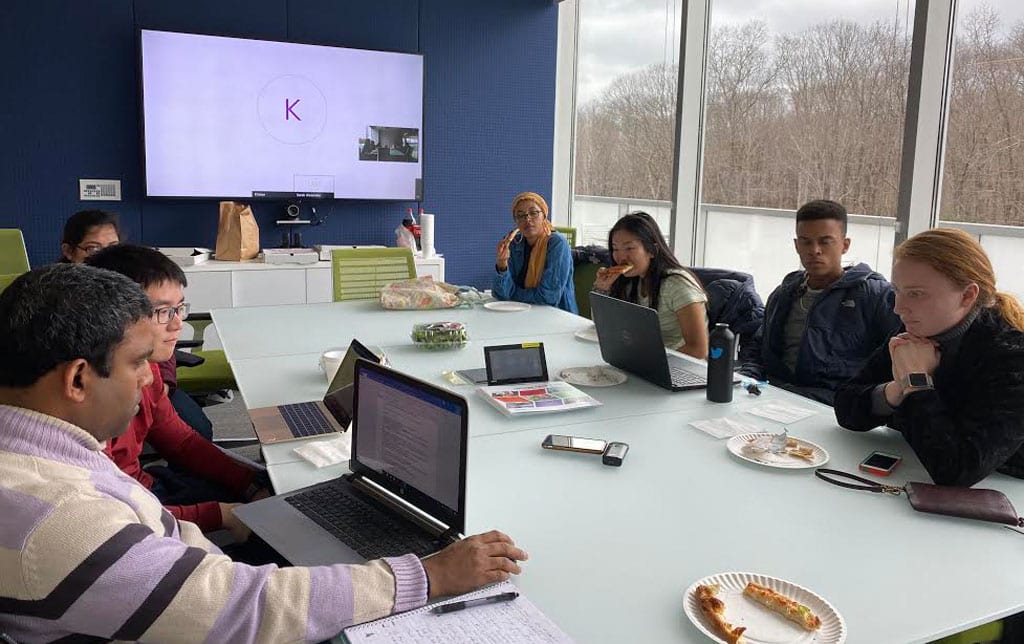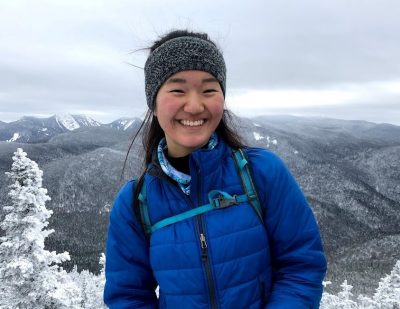Author: Genevieve Rigler
Interview with Sarah Alexander and Ezana Atsbeha
As we have emerged into the third year of the project, with two wet season and a dry season forecast, UConn Sociology graduate student, Faith Curry, had the chance to organize a close in person interview with Sarah Alexander (UW Engineering graduate student), and Ezana Atsbeha (UConn Sociology graduate student), on their experiences while communicating the forecast bulletins. See the video to understand their thought process behind the final upshot, associated challenges and other socio-technical aspects.
Unexpected Rainfall: Spring 2020 Brownbag Kickoff
Graduate and undergraduate students met on January 28th, 2020 to kickoff the spring Brownbag session series. The meeting encompassed a vibrant conversation with Ezana Atsbeha, UConn PhD student from Sociology Department, who shared information from the field, such as unexpected rain and the implications of that on the farmers with whom he regularly speaks. It was interesting to know that last year, it rained more than normal even in the start of the dry season (November and December) which partially stopped the early reservoir release operations. This brought a sense of positivity to the farmers in general, since the soil conditions were wet in the dry season without involving much reservoir irrigation.
There were however, cases of some Maze crop damage, but whether they tie to the structural damages in one of the main canal sections, or the irrigation loss, or something purely related to the decision of changing the mainstream seeds for the season, needs to be further investigated. Another important information was that this irrigation season, there has been some quaternary and tertiary canals which were not fed by irrigation or in other words, deprived from irrigation flow completely. This needs more investigation as well, but at this point it merely agrees with the groundwater model results produced by Fahad, which shows that in non-regulated case simulations (i.e. when all secondary canals are fed with their maximum capacity from the available main canal release) there are at least 2-3 command areas which do not receive much irrigation!
Unexpected rainfall peaked the interest of both sociologists and engineers alike in the room. Sarah Alexander, a University of Wisconsin CEE PhD student, engaged the group to discuss what would empower or catalyze a change in behavior, as the models require a link between knowledge dissemination and a change in behavior such as buying more/less/different seed. Genevieve Rigler inquired with Ezana about crop rotation and government programs for collective farming. Lastly, Ezana reported from the field that farmers were inquisitive about the forecast bulletin! The meeting ended with a light fare and as always, deep conversation. They will be meeting next month to discuss further.
UConn Undergraduates Reflect on the Summer Field Visit
As the calendar year of 2019 has come to a close, several of the undergraduate students who went on the Ethiopia field trip reflected on their journey.
“The trip to Ethiopia was very impactful on my current mindset. Experiencing the culture firsthand was an irreplaceable experience that I will always remember”, says Leonardo Abreu.
Irreplaceable it certainly was.
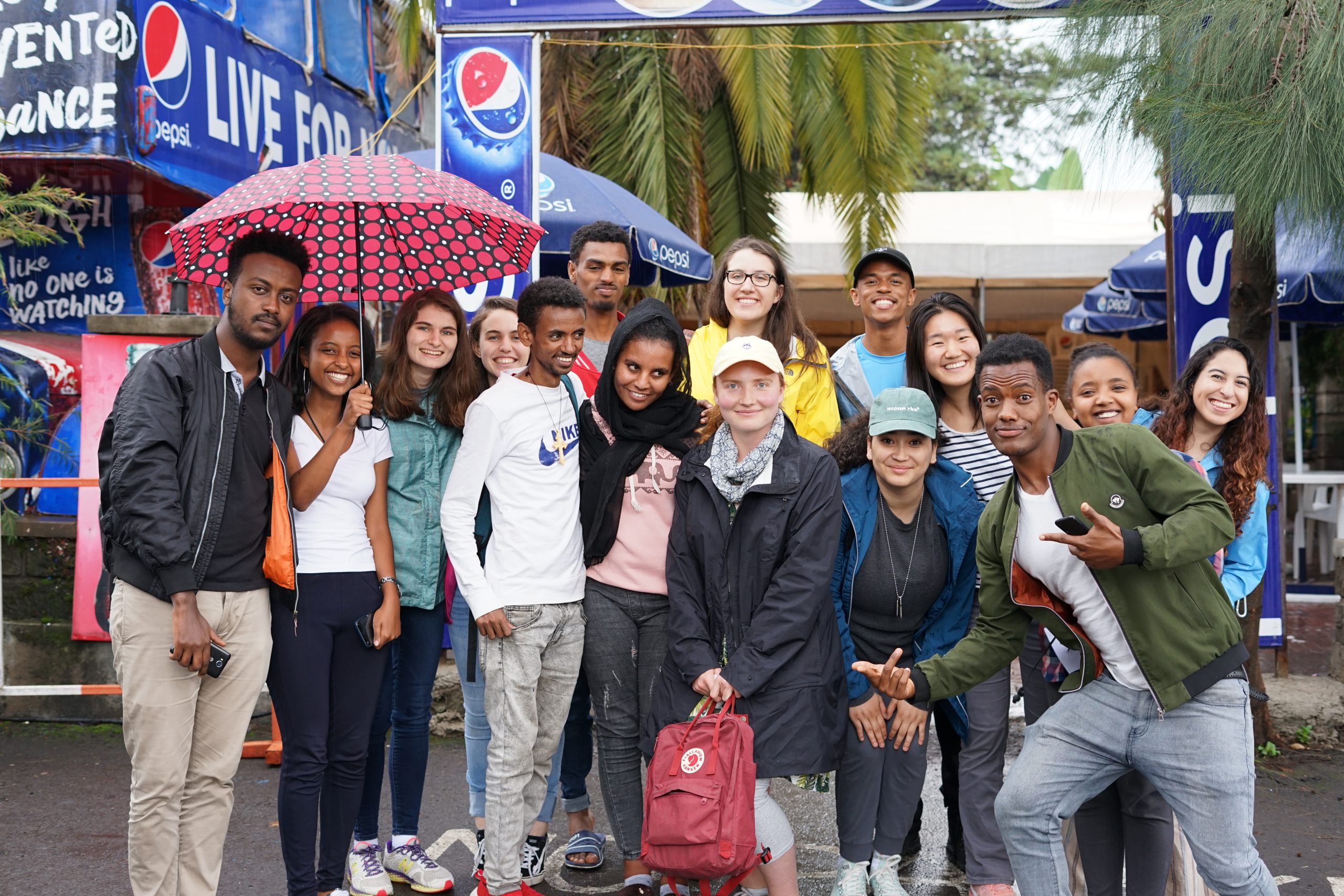
The UConn students arrived during the time when Ethiopian high school students were taking their exams. This meant that the internet was disabled, for the entire country. This included restrictions to social media platforms include WhatsApp, and SMS text messaging was disabled. Xinyu Lin recalled, “my experiences in Ethiopia made me reflect on Western society’s hyper-connectivity and find appreciation in being fully present in daily life.”
With that, the students enjoyed a full agenda of museum and city tours led by Dr. Atsbeha. One excursion included going to the oldest university in Ethiopia, located in Addis Ababa and being generously hosted by Dr. Abeje Kassegne. He introduced the UConn travelers to his sociology students, right before a torrential downpour where nearby construction was halted and the bajajs pulled over because the rain was too heavy to see.
“Meeting university students that were around our age was interesting as we listened to their perspective on Ethiopia and the US,” Leo states. “They are so knowledgeable of their city, their history and their university” Amanda added after all the students went to the university museum.
In addition to getting to know Addis Ababa and Bahir Dar, the students went to the field where they were paired with PIRE researchers and shadowed their daily research routine. “It was really enlightening, and very necessary, to see the context and community that the research I’m conducting is based in,” says Xinyu.
“A major concern with international engineering projects (specifically, projects where the U.S. is involving itself in the Global South) is that they often do not involve true community involvement in or desire for the project. This work also frequently suffers from a lack of genuine understanding of the culture in which the project is being built. Such shortcomings lead to miscommunication at best, and long-lasting detrimental effects on the community at worst; in this case, only those who are “helping” are the ones being fulfilled by the experience. The UConn PIRE project bucks this trend,” says Sophie McDonald.

“Through the project, I am lucky to have worked with such an interdisciplinary team that values the importance of the sociological, human component of engineering work and is committed to mitigating the mentioned issues. I’m also so very, very lucky to have travelled with a group of kind, thoughtful, and overall incredible fellow undergrads,” Sophie concluded.
The trip was shortened by two weeks due to the politics in Bahir Dar. For many students, this was a detail of the trip rather than the highlight.
The hills and valleys of the trip would not have been the same without the help of Dr. Phoebe Godfrey who attended with the students. She helped engineering and science students practice the sociological perspective in a tangible way throughout the trip. In the same way, the sociology graduate students already present in Ethiopia offered invaluable experience and guidance to the undergraduates, such mentorship was a unique experience afforded by this research.
September 2019 Brownbag
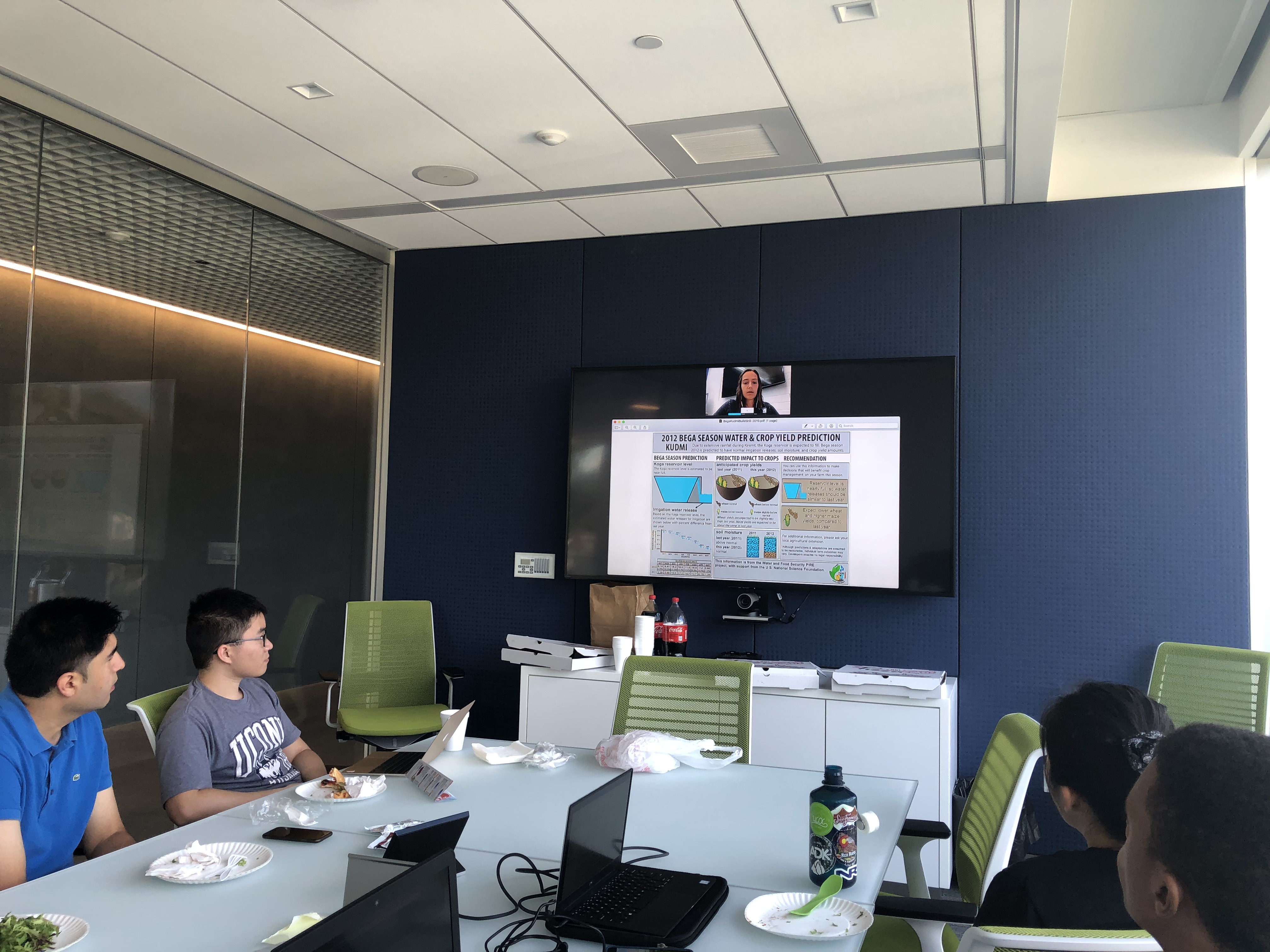
The first brownbag for the fall 2019 semester was held in March 7, 2019. There were a lot of updates from all corners, and the meeting took place for about an hour and a half. For the context of the project, it was an extremely busy schedule for the engineering modelling team, as they had to finish all model simulations to get the seasonal forecast ready in time.
The meeting first heard from the undergraduate participants, on their invaluable experiences from the Ethiopia summer field visit. For all the undergraduate students, it was their first visit to a new continent! It was decided that they will submit a reflection report based on their visit. Also, interested undergraduate students would be provided with the opportunity to continue research within the NSF PIRE project.
There were discussions on the individual research updates. Genevieve Rigler, an undergraduate student from UConn recently attended a conference in the University of Oklahoma and presented a poster on the PIRE Citizen Science project. Xinyu Lin, another undergraduate student who is committed to doing her thesis with the PIRE project will also continue her research for the next two semesters.
The graduate student team discussed in very detail about the development of the dry season Forecast Bulletin. The social science team from Ethiopia remotely connected for the meeting and provided valuable updates on the feedback they received from the initial forecast dissemination. A few updates to the existing draft bulletin was discussed and accepted. The engineering team talked about their model findings in very brief. Overall it was decided that in the next Brownbag they will continue discussions on inter-disciplinary research, agent based modelling techniques, and on ideas of how to improve the forecast bulletins from now on.
March 2019 Brownbag
The second brownbag for the spring semester was held in March 7, 2019. Like the previous summer brownbag, this one also experienced less participation. Almost all the social science graduate students were away in Ethiopia for their data collection.
In this Brownbag, the participation of the undergraduate students was highlighted. As the NSF PIRE project gave the opportunity to a total number of 9 undergraduate students to perform pilot research projects within the scope of the PIRE Water and Food Security Project, they took the time to discuss about their specific plans. The engineering graduate students who were present in the Brownbag discussed with the undergraduates on the feasibility aspects of their research plans.
The graduate students also discussed about their specific plans for the field visits, with emphasis on the summer school activities and model results. In short, the specific actions performed in the Brownbag was,
- Discussing with UConn undergraduate students regarding their research plans.
- Sharing research ideas and providing a brief understanding on the project goals.
- Discussing engineering model results, social survey feedbacks from field, etc.
- Detailed plan on Summer 2019 field visits and expectations.
- Demonstration of the summer school activities to be held in the Summer of 2019
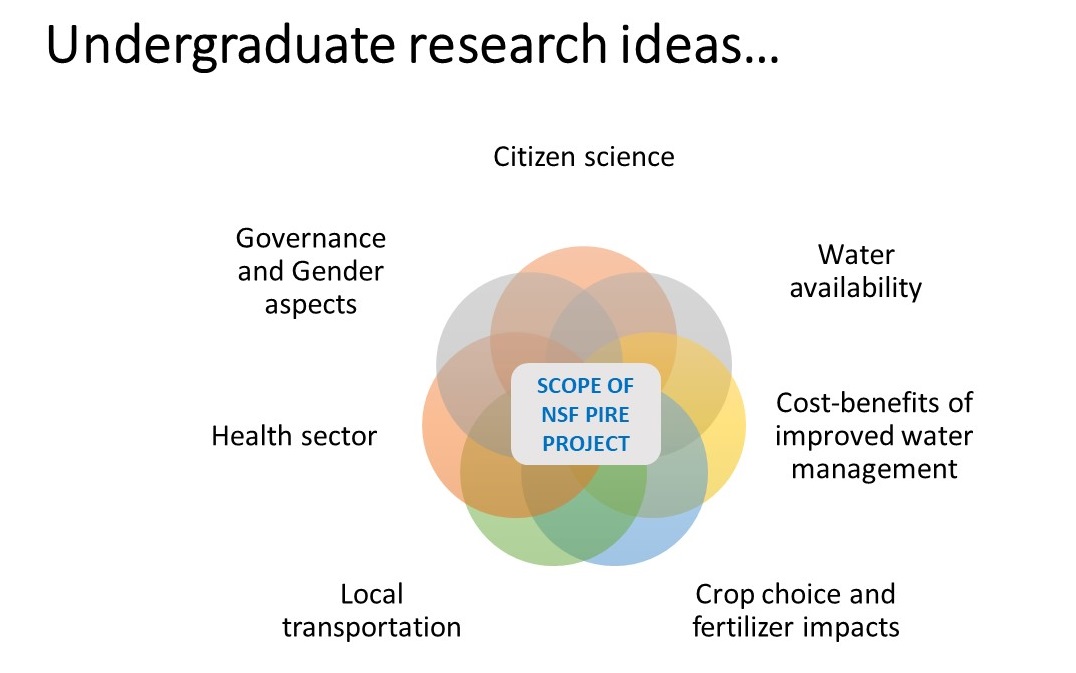
February 2019 Brownbag
The first brownbag for the spring semester was held in February 21, 2019. The meeting experienced less participation than usual, since most of the social science researchers were already away in Ethiopia for their data collection. One of the changes in the Brownbag was the inclusion of a broad number of undergraduate students. For the spring 2019 semester, the participation of the undergraduate students was emphasized. The NSF PIRE project gave the opportunity to a total number of 9 undergraduate students to perform pilot research projects within the scope of the PIRE Water and Food Security Project. The Spring semester Brownbag was structured in a way that it helps the undergraduates with their research plan, field visit preparation, etc. The Brownbag is an excellent platform where students from all disciplines and all tiers get the opportunity to interact, talk with themselves and hence allow a greater exchange of knowledge and information.
The specific actions performed in the Brownbag was,
- Introducing the UConn undergraduate students and hearing out from them on their
research proposals. - Sharing research ideas and providing a brief understanding on the project goals.
- Brief plan on summer 2019 field visits and expectations.
Sensor Development Team Highlighted in UConn Today
In the PIRE project, a Citizen Science Initiative (PIRE CSI) is in place that helps collecting soil moisture information which are collected by farmers and high school students, and later on used in the advanced hydrological models (CREST and MODFLOW). From the summer of 2018, we have installed a few state-of-the-art soil moisture sensors that help collect more distributed information, in addition to our already existing TDR measurements. The new sensors developed by the team of UConn engineers, led by Dr. Baikun Li and Dr. Guiling Wang, is environment friendly and very inexpensive. These could save nearly 35% of water consumption and cost far less than what exists. Current sensors that are used in a similar way range from $100 to $1,000 each, while the one developed at UConn cost $2, according to the researchers.
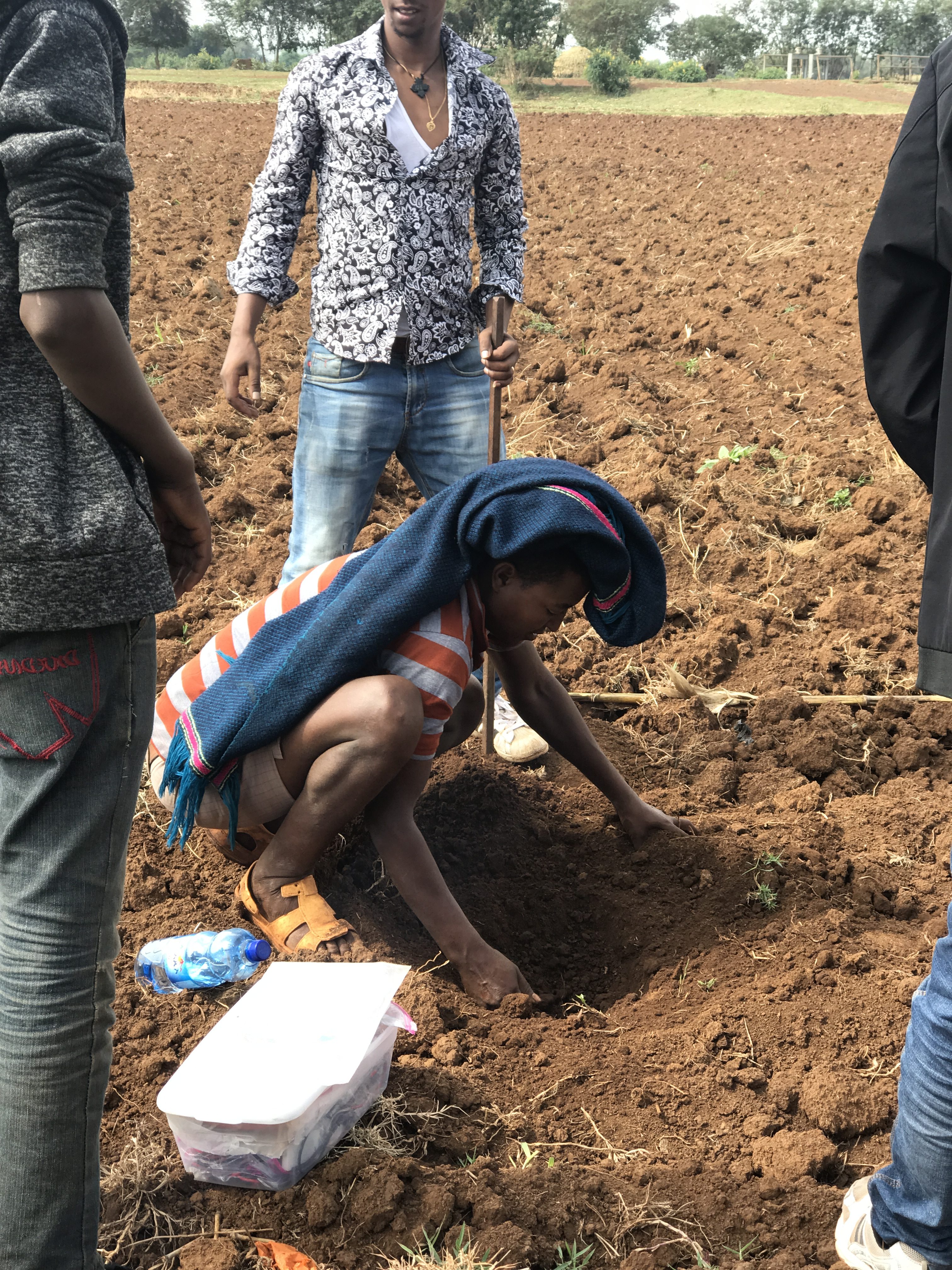
Dr. Li, Dr. Wang, and the UConn sensor development team was featured recently in UConn Today. Dr. Wang, a soil moisture hydrologist, says “On the science side, the new sensor will help address the scarcity of in-situ soil moisture data that has been a major challenge for the advancing of hydrological science; on the humanity side, there is great potential for this low-cost new technology to be used in the developing world to help improve agricultural productivity”.
These sensors were installed with the help of Ethiopian partners during the summer of 2018 alongside a team of UConn graduate students. Originally the sensors measure soil electrical resistivity, which provides an understanding of the amount of water contents available in the soil to allow exchange of ions. Later on, the resistivity data is converted into soil moisture variable through calibration with TDR records. Since the summer of 2018, approximately 150s of these sensors have been installed in different locations of the four field sites in the Amhara Region of Ethiopia. In each location, two sensors are placed at 20-cm and 40-cm depths. The farmers have been trained to use these sensors and so far, the data collection and monitoring has been a great experience!
For the full UConn Today article, click here
Genevieve Rigler, PIRE Researcher, speaks at annual Women Who Build Summit
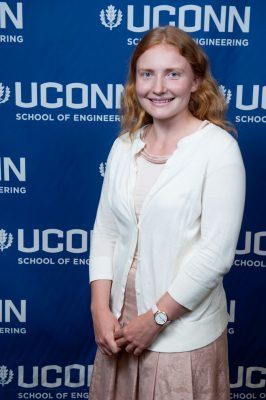 Genevieve Rose Rigler, PIRE undergraduate researcher, spoke as the only undergraduate student at the annual Women Who Build Summit on February 21, 2019. The event was hosted by the Construction Institute at Goodwin College with professionals from the field of architecture, engineering and construction in attendance for the educational presentations, motivational stories and networking opportunities.
Genevieve Rose Rigler, PIRE undergraduate researcher, spoke as the only undergraduate student at the annual Women Who Build Summit on February 21, 2019. The event was hosted by the Construction Institute at Goodwin College with professionals from the field of architecture, engineering and construction in attendance for the educational presentations, motivational stories and networking opportunities.
The speaking opportunity first began when Carolina Cudemus, Genevieve’s Professional Women in Construction mentor of two years, invited her to serve on the Women Who Build Summit Planning Committee. Through the series of weekly phone conference calls, she was then asked to speak as one of three panelists at the breakout session she had helped plan.
The session was titled “Do You Know What You Want?” She shared her career journey which included detailing the personal and professional growth afforded to her via her work with PIRE.
When asked about faith in her abilities to make pivotal life decisions, she answered,
“There is always an inherent risk to making career decisions, or decisions in general. If you know the answer before you began, this would be a limiting factor to the many benefits the process of creativity yields. Not knowing is not a bad thing; there is a lot to be learned in the process of saying yes.”
She concluded with her gratitude that her journey, arduous at times, led her to be working on the PIRE project.
Xinyu Lin, PIRE Undergraduate Researcher, receives BOLD Women’s Leadership Network Scholarship
Xinyu Lin, an undergraduate researcher on the PIRE project, has been selected as one of nine inaugural BOLD Scholars at the University of Connecticut. The BOLD Women’s Leadership Network – launched at five universities across the country led by female presidents who have demonstrated a commitment to collaboration, innovation, diversity, and inclusion – facilitates opportunities for young women leaders to utilize their unique identities and experiences to create positive social change. BOLD provides scholarship and fellowship funding, leadership programming, and connects Scholars with women faculty, staff, philanthropists, entrepreneurs, and alumni through a strong inter-generational network. Xinyu will be conducting a leadership service project over the summer centered around her interests in environmental stewardship and addressing climate change.
Her work on PIRE will focus on the sustainability of water resources in Ethiopia. She plans to develop an integrated groundwater footprint of Ethiopia, under the mentorship of Dr. Zoi Dokou, which will present both the quality and the quantity of groundwater available for use and at the same time investigate barriers to water access, since Ethiopia has among the lowest access to clean water.
More information on the BOLD program is found here: https://ugradresearch.uconn.edu/bold/
November Brownbag Speaker: Dr. Abeje Kassegne Visits PIRE Students
“Engineered systems are only as powerful as they are practical for the users”, notes Genevieve Rigler, civil engineering undergraduate, at the end of the guest speaker lecture on November 29 by Dr. Abeje Kassegne’s, one of PIRE’s Ethiopian-based international collaborators.
PIRE students came to celebrate the end of the semester with a guest visit from Dr. Kassegne, professor of Sociology at Addis Ababa University. Dr. Kassegne’s research focuses on migration and community development, agricultural extension, rural livelihoods and indigenous farming systems, making him a valuable member of the PIRE research team and community, which was apparent through his thoughtful andragogy marked by rich discussions throughout the presentation.
He began with an overview of Ethiopia, stating that it is the second most populous country in Africa with a population of 105 million, 65% of which are under 30 years old. The physical landscape lends itself to the issue of drought and the effects of climate change which makes for an interesting intersection between social science and scientists.
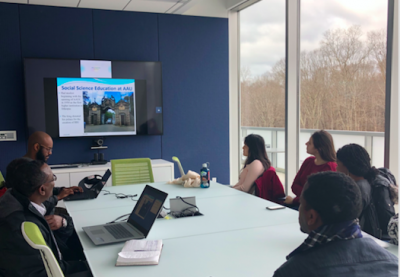
“The population has a robust culture variance with many ethnic and religious group. The ethnic-based federalism is hailed by some and criticized by others. However, there is optimism for the future as the new leadership shows as populist, progressive, pro-Ethiopian and inclusive. Recent political success includes the border conflict with Eritrea being settled amicably, thousands of political prisoners being released, the reformation of the justice system, the establishment of the Ministry of Peace and, most recently, the election of the first female President by members of the Ethiopian parliament” he states.
Dr. Kassegne went on to explain the preservation and evolution of social science through political history. “Sociology provides knowledge, perspective and expertise of Ethiopian realities from an in situ point of view. Appreciating indigenous knowledge and indigenous conflict resolution mechanisms will be a valuable entry point for Ethiopian social scientists in the immediate future”.
Sociological expertise for the lifecycle of the research and project in the field is manifold, PIRE sociologists work to:
- Examine the social organization of irrigation (e.g. the water users’ association)
- Promote and integrate gender in the design and implementation of irrigation projects
- Understand conflict resolution mechanisms in the use of irrigated water
Dr. Kassegne’s visit illuminated the social landscape for students yet to travel to Ethiopia and offered valuable insight for graduate students currently conducting their work and for the engineering undergraduate students who will develop their research project and methods in the spring of 2019.
The next discussion between Dr. Kassegne and the PIRE students will be in the summer of next year, in Ethiopia.
A Multidisciplinary Turnout: Undergraduates Attend Informational Meeting to Engage in Researching Opportunities
On Monday, November 12, the Food and Water Security PIRE team held an informational session for students interested in joining the project as an undergraduate researcher. The event started with baked goods and coffee from the local Cafemantic eatery as the students trickled into the classroom, finding safety from the cold. After ample time to warm up and settle down the presentation began with opening words from Dr. Elizabeth Holzer, the Project Investigator, “this project is unique in its’ dual-natured approach, it is a partnership between sociologists and our environmental engineering friends”, she enthusiastically stated before introducing Dr. Zoi Dokou, Project Manager and UConn Environmental Engineering professor. “Ethiopia’s very short rainfall season coupled with the extreme hydroclimatic environment makes it a very challenging situation for the engineers to model. However, it also makes it the most valuable for the stakeholders and farmers,” Dr. Dokou states.
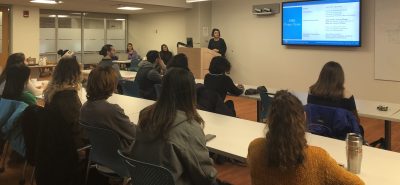
Dr. Dokou proceeded to give a summary of the research completed since the beginning of the project in 2016, the pending objectives to be completed by 2021 and the engineering side of the research. Her technical engineering and explanation of the models being formed for this project was contrasted with the words of PhD student, Nabil Tueme who also serves as the PIRE Undergraduate Coordinator, “we often treat scientific investigation as apolitical or value-neutral. Yet, science is a socially situated human practice.” Nabil further explained how the sociological understanding is imperative to the long-term success of the engineering solution. To capture this idea she stated the project’s goal, “how do the relationships between scientists, farmers, water managers and other authorities, influence the production, dissemination and outcome of new scientific knowledge?” and informed the undergraduate students of potential research topics, should they choose to apply.
“How can we be sure we are positively influencing these villages?” asked a student, to which Dr. Phoebe Godfrey, fellow Undergraduate Coordinator and UConn Sociology Professor answered, “intention matters; measuring positive and negative effects is very complex and that is a great question, one that sociologists seek to answer and it is certainly good grounds for your research proposal”, she states. Dr. Godfrey introduced the spring workshops that selected students would partake in before their trip to Ethiopia in June which includes linguistic training in Amharic, Ethiopia’s nationally spoken language, guest seminar speakers, engineering project highlights through sociological perspective in a reading and discussion-based format. She opened the floor to questions regarding the informational material presented. With a hand raised, current PhD environmental engineering and sociology student, Sardor Musayev asked, “Will we be having fun?”, to which the room once filled with pensive thought broke into warm laughter. “Yes, we will be learning and growing together, and that is always fun”, said Dr. Holzer. “Today is about finding out what question you personally want to be answered in the scope of this research project. It is especially unique for selected undergraduate students because you may have the opportunity to collect the data yourself in Ethiopia”. Dr. Holzer then opened the rest of the meeting to the question and answer session so undergraduates could ask their questions and talk with the current PIRE graduate students with whom they may travel in Summer 2019.
For a summary of the project and for information if you are an undergraduate, the powerpoint may be downloaded: PIRE Informational Meeting 11-12-18
November Brownbag: Forecast Bulletin & Understanding Women Empowerment
PIRE graduate and undergraduate students gathered on November 5th for one of their last brownbags, where civil engineering PhD student Sara O’ Alexander from University of Wisconsin spoke on the development of the project bulletin followed by sociology PhD student, Selam Negatu, from the University of Connecticut on understanding women’s empowerment.
The developer of the bulletin, Sara, led the discussion of preliminary versions of a forecast bulletin that can be used as part of the PIRE communication strategy to share modelling and rainfall prediction results with the communities we are working with in Ethiopia. She got feedback from the graduate student team that could inform future iterations of the product. Students had a robust discussion on what figures were understandable, what elements were still unclear or hard to interpret, and suggestions for improving the communication of results. The importance of understanding local knowledge and current climate related discourse, as well as what information is valuable to farmers and water managers, emerged as key questions that the team will focus on moving forward.
Selam began with stating first that the term empowerment elicits various definitions and responses within the social science research sphere; overall there is a lack of agreement since empowerment may range to mean participation, power, choice, freedom, an enabling process or the capacity and skill to use available resources and opportunities to maximize one’s own potential.
“Understanding the issue of women’s empowerment is a conceptual tool to forward the gender equality agenda”, she states.
“Failure to observe engagement of women in the management of communal resources such as water for irrigation derails intended outcomes of interventions”.
Selam’s research interest entails: how women’s empowerment is conceptualized and is practiced in development programs in Ethiopia, what is meant by development/empowerment from the bottom and how that is translated into practice in the context of water security, if non-participation is disempowerment or is it an expression of women’s agency and lastly how to move away from consultation, Tokenism, “add and stir approach” to women’s empowerment. Answering these questions could have immediate impacts on improving water supply and gender within the communities with which PIRE is working, including:
- Time saving: Irrigation schemes helped women in accessing water for domestic purposes, such us cleaning and for construction. This has brought positive changes in the reduction of their workload and in saving time (Romano, 2013).
- This can enable women to participate in other economic activities, young girls will be freed from carrying water to attend school, and adult women can engage in more productive work on the farm (Awulachew et.al, 2005).
- Increased security for women once exposed to violence while collecting water (Calow et.al, 2013)
- Irrigation provide significant benefits to rural women by enabling women farmers to increase their cash incomes and diversify family nutrition and food sources (IWMI,2010; Calow, et.al, 2013)
- Active participation of women in water projects challenges gender specific roles and contribute to changing traditional perceptions about women’s status, skills and capabilities held by the community, the family and sometimes women themselves.
PIRE’s Next Step: Joining Curious Undergraduates to the Team
Recruiting engaged undergraduate students from engineering and liberal arts backgrounds is pivotal to the objectives of PIRE, to that end, substantial efforts were made to ensure application information was thoroughly publicized across the University of Connecticut campus.
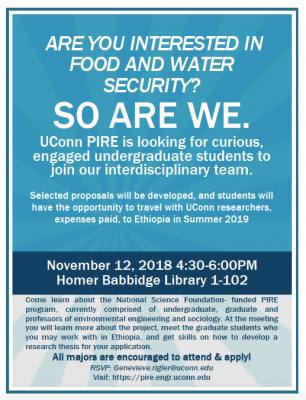 The preliminary stage of outreach began with contacting student clubs and organizations listed on the UConntact website that expressed interests and objectives similar to that of the project, these groups included: Women and Minorities in Economics, Honors in Diversity, Spring Hill Valley Farm and The UConn Chapter of National Organization for Women.
The preliminary stage of outreach began with contacting student clubs and organizations listed on the UConntact website that expressed interests and objectives similar to that of the project, these groups included: Women and Minorities in Economics, Honors in Diversity, Spring Hill Valley Farm and The UConn Chapter of National Organization for Women.
Additionally, the six cultural centers as supported by Diversity and Inclusion were contacted, including the African American Cultural Center, Asian American Cultural Center, Puerto Rican/Latin American Cultural Center (PRLACC), Rainbow Center and Women’s Center.
The Human Rights Institute housed by Global Affairs, whose aim is to promote interdisciplinary research and teaching across the university, was also contacted and encouraged to forward the PIRE media to their student database.
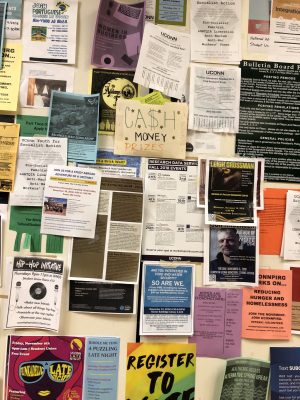
On October 17, Project Manager and Professor Dr. Zoi Dokou, Undergraduate Coordinator and PhD student Nabil Tueme and undergraduate civil engineering student Genevieve Rigler represented the PIRE project and collected an email list of interested students at the Research Connections 2018 event.
A brochure to coherently summarize the project objectives and undergraduate involvement was created and then designed by Claudia Dijmarescu, media specialist and civil engineering undergraduate PIRE student. The brochure was successfully published into two cycles of the newsletter sent to all Honor Program students and a newsletter to PRLACC students. Twenty copies of the printed version of the Informational Meeting advertisement were distributed to the Homer Babbidge Library, McHugh Hall, Francis L. Castleman Building, Neag School of Education, Office of Early College Programs, ITE Building and the Weston A. Bousfield Psychology Building.
The Informational Meeting was held on November 12, 2018 with twenty students from manifold backgrounds were in attendance.
PIRE Student Brownbag Kickoff with Ethiopia Summer Field Visit Summary
The academic year for sociology, engineering and agriculture PIRE graduate students began with the kickoff of monthly brownbag meetings on September 24,2018; the students expressed from the previous semester a mutual interest in learning about their peers’ research work more intensely and in a group setting.
Joining the graduate student was the addition of four undergraduate civil engineering students who would begin formulating their research projects in the spring of 2019 and wanted a thorough introduction to the individuals and work being done.
Several weeks before this meeting the students met to discuss what their expectations of the series would be and what material they would like to cover. Everyone agreed to present their individual work in their format of choice (discussion, presentation, worksheet etc.) and to create points of discussion as a group. At this preliminary meeting, Kristen Kirksey, sociology PhD student, and Genevieve Rigler, civil engineering undergraduate student, volunteered to work together to organize the dates and topics of presentations then later brainstormed potential discussion topics that would engage the engineers and sociologists in fruitful dialogues. (This discussion was fruitful in itself!)
Each session would begin with an ice breaker, followed by a presentation from a graduate student, then a time to ask questions over lunch.
“It is nice to learn the terminology of a discipline outside of my own expertise in a comfortable setting”, expressed sociology PhD student Ezana Atsbeha.
Everyone agreed.
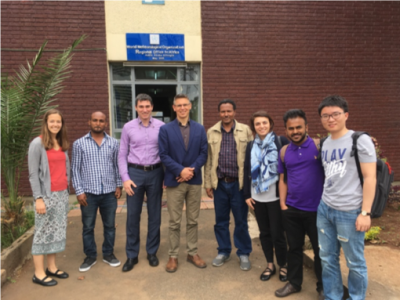
Meijian Yang and Fahad Khadim, both civil and environmental engineering PhD students, presented their completed work during the field visit to the sites in Ethiopia over the summer of 2018. Meijian presented the field visits to Branti, Koga, Markudi and Quashni, the four sites of interest for the project located in the Tana Basin, where the engineering teams from UConn and Bahir Dar University, installed new soil moisture sensors. The sensors were developed by Dr. Baikun Li’s group at UConn, led by Wangchi Zhou, an environmental engineering PhD student. The advantages of the simple circuits installed are that they are inexpensive, easy to assemble, install and use and they are reliable. Meijian finished by opening for discussion how the sensors can be improved and how the data can be used in the models.
Fahad presented the visit to Koga Resevoir and the meetings with various local stakeholders such as the Abay Basin Authority in Bahir Dar, the national Meterological Agency, the Ministry of Water, the Bahir Dar University and the PIRE workshop hosted at the International Livestock Research Institute (fellow CGIAR to PIRE-partner IFPRI). He also discussed about the meetings with the citizen science team, consultations with farmers, the collection of local information, and, how this trip helped him to gain hands-on experience and develop a qualitative understanding on the project area.
The five key takeaways he shared with the group were:
- Predicting the cropping season water availability is very important for ABA.
- People use water drinking purposes from hand-dug shallow wells after chlorination (woman and child take responsibility of taking water, owner bears the expense while a group of people carry out the construction).
- Water from those wells is also used in livestock and some irrigation (i.e. tomato). Irrigation of other crops (sargam, corn, wheat, teff) are mostly rain-fed.
- Knowledge, information and forecasts on groundwater levels has potential to improve farm-scale irrigation
- Farmers change the pattern depending on their interest and cost of seeds.
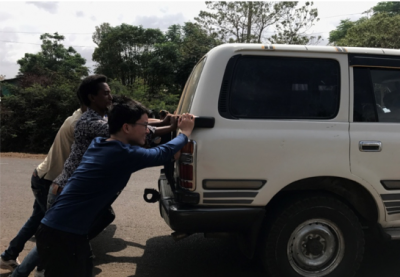
The trip was as academic as it was enjoyable. With a smile he told the story of some car trouble the group had along the way and described the experience as “very team building”.
